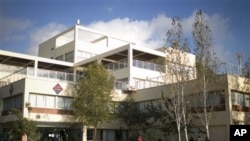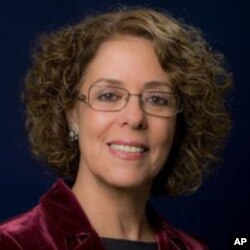A committee of Israeli university leaders has spoken out strongly against the recent boycott by a group of academics of an Israeli university in the occupied West Bank. Educators signed a petition refusing to participate in activities at the Ariel University Center of Samaria, which is located in Ariel, the fourth largest Israeli settlement in the West Bank.
Professor Rivka Carmi, president of Ben Gurion University of the Negev and chairperson of the Committee of University Heads in Israel, speaks with VOA's Cecily Hilleary.
|
Full interview with Professor Rivka Carmi:
|
Hilleary: The letter’s co-signers say they oppose the Israeli occupation of the West Bank and the settlements themselves. I spoke with one of the signatories who said he was surprised by the reaction of the Committee of University Heads, of which you are president. What was that reaction?
Carmi: Well, the reaction was very precise. We were saying actually what we were saying all along, that we are totally against academic boycotts. We have voiced this very decisive opinion for a long time now, and we have presented it and expressed it in every situation. So this is nothing new.
We condemn boycotts, wherever and whenever - by out of Israel institutions, by Israeli institutions, against Israeli or non-Israeli institutions, by organizations, by individuals. We don’t think that there are different kinds of boycott. A boycott is a boycott, and we are against it.
|
Interview with Dr. Nir Gov, professor at the Weizmann Institute of Science in Rhehvet, who initiated the petition:
|
Hilleary: Ariel is a settlement and it does lie well into the West Bank. Do you have an opinion and what would its fate be if a two-state solution were reached?
Carmi: My personal opinion is not relevant at all. And the presidents of the universities in Israel, this committee, is comprised of various people with various political opinions, which go all the way over the political map. And it’s not relevant, because what we are actually relating to is to the academic aspect of this issue and about boycott.
Hilleary: Let me ask you about those people who did sign the letter. Who are they, and how many of them - if any of them - are faculty members at Ariel [University]?
Carmi: I think all of them are [on] faculties at various academic institutions in Israel, mostly universities, about 150 or 160 of them, while the overall number of Israeli faculty is over 5,000. So it is a minority. Even if there are other supporters that didn’t sign the petition, it is still a minority of the academic body in Israel.
Hilleary: You are president of Ben Gurion University in the Negev. Were any of the professors at your own institution signatories?
Carmi: Yes.
Hilleary: Will this impact their standing within the University?
Carmi: Well, you know, this is a democratic country, and everybody is entitled to her or his own political views. The only thing that we are against is for using the name of the institution that you are related to academically for such a petition, which is actually is presenting your own personal political view. It has nothing to do with your status as a faculty member.





